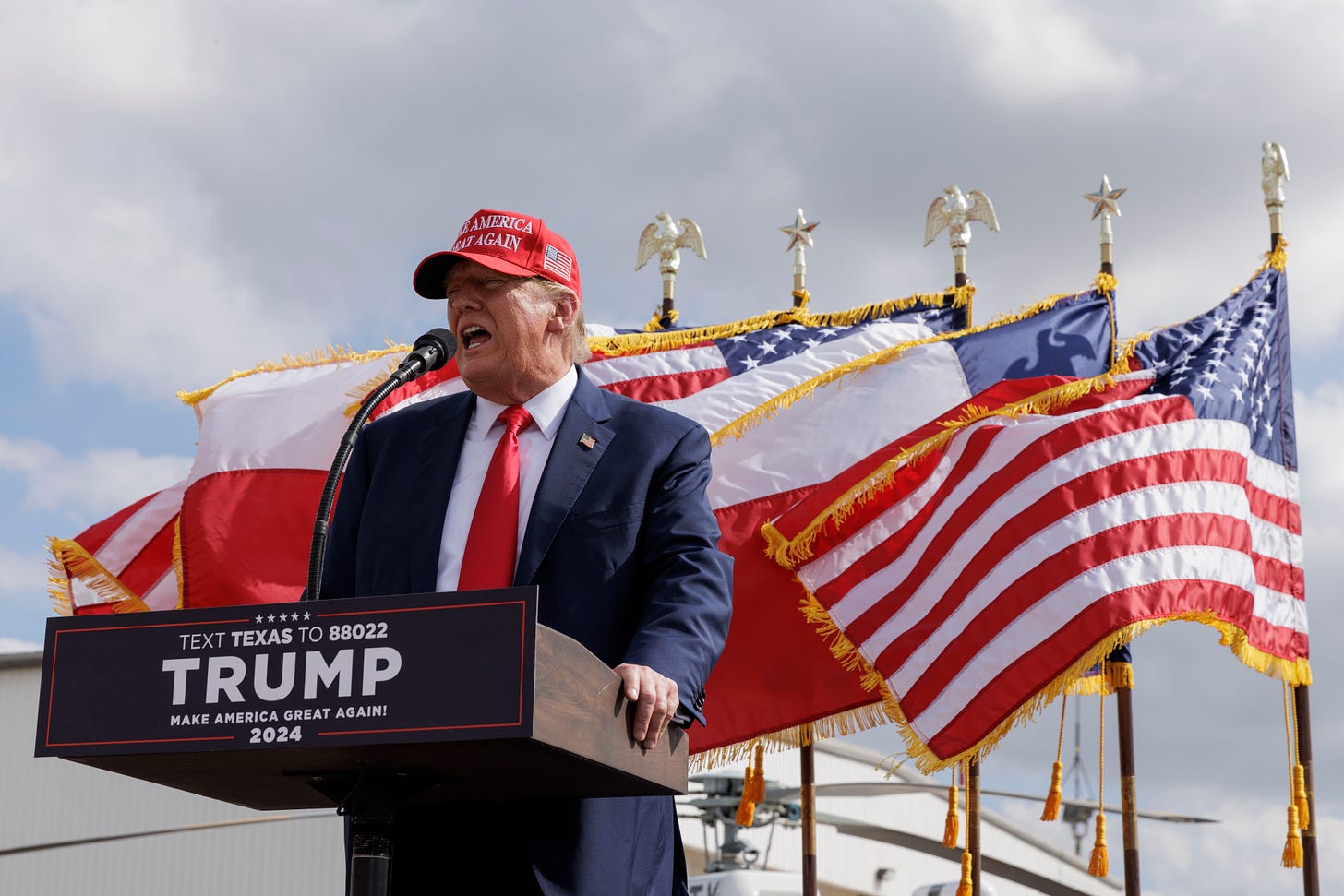Four Things to Know About the Trump ‘Gag Order’ Clash
He was ordered not to make remarks that “target” individuals connected to his pending January 6th trial.

YOU MAY HAVE HEARD that Donald Trump chose to celebrate Thanksgiving by raging on social media about his civil fraud trial now underway in New York—including trash-talking the prosecutor, the judge, and the judge’s clerk. Over the last month he has also raged about the special counsel who brought two federal cases against him—“Deranged Prosecutor Jack Smith,” Trump calls him—and about U.S. District Judge Tanya Chutkan, who is overseeing one of those two federal trials, the one focusing on alleged conspiracy and obstruction of justice in connection with the attempt to steal the 2020 presidential election and the attack of January 6th. Trump has called Chutkan a “very Biased, Trump Hating Judge” from the “RADICAL LEFT” who is “a TRUE TRUMP HATER” with “a major, and incurable, case of TRUMP DERANGEMENT SYNDROME.”
Trump’s many public remarks about the figures involved in that case—which haven’t been limited to name-calling—provoked Judge Chutkan to issue an order on October 17 that restricted Trump from making threatening statements about Smith, Justice Department and federal court staff, and witnesses. And last week, the U.S. Court of Appeals for the D.C. Circuit heard oral argument on whether the judge acted within her authority. Here are four things you need to know about this dispute over the Trump “gag order”:
1. The legal question is about balancing Trump’s incendiary speech with the safe and smooth administration of justice.
The legal question comes down to a basic balancing test: Does Trump’s right to speak through threats and harassment outweigh the court’s interest in ensuring safety for individuals implicated in the case and in the broader administration of justice? Trump argues that his speech is constitutionally unlimited. The D.C. Circuit will undoubtedly strike the balance elsewhere. “There’s a balance that has to be undertaken here,” said D.C. Circuit Judge Patricia Millett last week.
Chutkan based her decision on “undisputed testimony cited by the government” that “demonstrates that when Defendant has publicly attacked individuals, including on matters related to this case, those individuals are consequently threatened and harassed,” and that “since his indictment, . . . [Trump] has continued to make similar statements attacking individuals involved in the judicial process, including potential witnesses, prosecutors, and court staff”—including statements “that particular individuals involved in it are liars, or ‘thugs,’ or deserve death.”
As Jack Smith’s team argued:
There has never been a criminal case in which a court has granted a defendant an unfettered right to try his case in the media, malign the presiding judge as a “fraud” and a “hack,” attack the prosecutor as “deranged” and a “thug,” and, after promising witnesses and others, “IF YOU GO AFTER ME, I’M COMING AFTER YOU,” target specific witnesses with attacks on their character and credibility, even suggesting that one witness’s actions warrant the “punishment” of “DEATH!”
Based on this record, Chutkan concluded that “such statements pose a significant and immediate risk that (1) witnesses will be intimidated or otherwise unduly influenced by the prospect of being themselves targeted for harassment or threats; and (2) attorneys, public servants, and other court staff will themselves become targets for threats and harassment.”
What’s more, the judge added, “that risk is largely irreversible in the age of the Internet; once an individual is publicly targeted, even revoking the offending statement may not abate the subsequent threats, harassment, or other intimidating effects during the pretrial as well as trial stages of this case.”
Nobody really disputes that Trump’s threatening speech is serious, and that internet trolls stoke violence.
2. Trump claims he can say whatever he wants unless and until DOJ can show a “clear and present danger” to someone.
Trump’s lawyers nonetheless argue that the threats alone are meaningless until they become a “clear and present danger” to a compelling governmental interest, such as keeping witnesses safe. And although MAGA followers have reacted disturbingly to Trump’s radical speech (Chutkan herself received death threats after Trump’s “If you go after me, I’m coming after you!” post), they add, “citizens of this country cannot be censored based on a fear of what others might do.” Trump also argues that a “Presidential candidate’s core political speech” should be handled with kid gloves under the First Amendment.
But let’s face it: No federal judge wants blood on their hands should things really get out of control and someone be physically attacked or killed. D.C. Circuit Judge Brad Garcia accordingly pressed Trump’s lawyer: “This is predictably going to intensify as well as the threats, so why isn’t the district court justified in taking a more proactive measure and not waiting for more and more threats to occur and stepping in to protect the integrity of the trial?”
3. Although the First Amendment protects political speech, speech advocating lawlessness, and the ability to speak without censorship, those protections have limits.
There’s some generic truth to Trump’s legal assertions. In Brandenburg v. Ohio, the Supreme Court in 1969 overturned the criminal conviction of a Ku Klux Klan member who made antisemitic and racist remarks under an Ohio law that made it a crime to “advocate . . . methods of terrorism as a means of accomplishing industrial or political reform,” establishing a test that looks to whether threatening speech is likely to incite “imminent lawless action.” Prior restraints on speech—in which the government reviews the content of speech before it is published—are also presumptively forbidden to the extent they amount to press censorship. Moreover, political speech—such as citizen discussions of electoral candidates and critiques of the government—is afforded especially strong First Amendment protections.
But that’s not to say that these categories of speech cannot be restrained at all. If the government has a really good reason to limit speech (a “compelling government interest”), it’s perfectly constitutional to do so. As the government argues here, Trump has no “constitutionally protected right to prejudice the trial in his favor” or “to use the media to influence public opinion concerning his case so as to gain an advantage at trial.” And according to Jack Smith’s team, Trump’s “long and well-documented history of using his public platform to target disparaging and inflammatory comments at perceived adversaries, regardless of whether they are military generals, judges, election workers, or court staffers . . . pose[s] a grave threat to the very notion of a fair trial based on the facts and the law.”
Tellingly, during the oral argument, D.C. Circuit Judge Cornelia Pillard told Trump’s counsel, “I don’t hear you giving any weight at all to the interest in a fair trial.”
4. The case could turn on the meaning of the word “target” in Chutkan’s order.
For the record, here’s what Judge Chutkan’s order states insofar as “gag” limits on Trump’s speech:
All interested parties in this matter, including the parties and their counsel, are prohibited from making any public statements, or directing others to make any public statements, that target (1) the Special Counsel prosecuting this case or his staff; (2) defense counsel or their staff; (3) any of this court’s staff or other supporting personnel; or (4) any reasonably foreseeable witness or the substance of their testimony. [Emphasis added.]
In other words, Trump can’t “target” Smith or his team, defense counsel and their staff, court staff, and witnesses. Here’s an important caveat:
[The order] shall not be construed to prohibit Defendant from making statements criticizing the government generally, including the current administration or the Department of Justice; statements asserting that Defendant is innocent of the charges against him, or that his prosecution is politically motivated; or statements criticizing the campaign platforms or policies of Defendant’s current political rivals, such as former Vice President Pence.
So Trump can still criticize the government, just not “target” individuals.
Trump argues, in effect, that Chutkan’s statement that Trump “does not have the right to say and do exactly what he pleases,” is wrong. The American Civil Liberties Union (ACLU), in an amicus brief, partly sided with Trump on the rationale that the word “target” is “ambiguous, and fails to provide the fair warning that the Constitution demands, especially when, as here, it concerns a prior restraint on speech.” The ACLU is worried less about Trump and much more about the precedent that Chutkan’s order could set in terms of the government’s power to silence the rest of us. The D.C. Circuit could wordsmith the order a bit with an eye toward protecting speech in other, arguably more “normal” cases.
TRUMP’S LAWYERS called Chutkan’s ruling “unprecedented.” They are correct—but not because the order is unfair to Trump. It’s unprecedented because Trump possesses an unprecedented amount of power to incite violence and hate among his followers, and as January 6th itself showed, he’s more than willing to use it. Meanwhile, the factual and legal arguments available for his defense are extremely weak. His best shot at dodging a conviction and jail time is to win the 2024 election, whatever it takes. The stakes are high for Trump. They’re also high for DOJ personnel, court personnel, witnesses and, ultimately, the Washington, D.C. jurors who will decide his fate.





